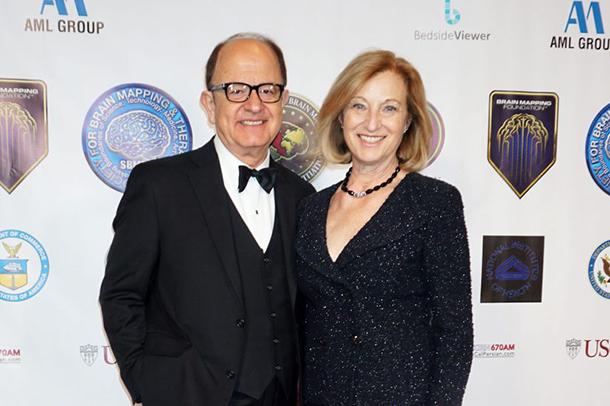USC President C. L. Max Nikias, PhD, was honored April 14 with the Humanitarian Award of the Society for Brain Mapping and Therapeutics. The award is presented to physicians and scientists who have made significant contributions to survival and quality of life of patients across the globe.
“It’s a tremendous honor to accept this award on behalf of the university,” said Nikias, emphasizing the priority USC has given to this important discipline.
“Because of the potential to improve the lives of so many people around the world, we have made significant investments and multidisciplinary appointments to advance our capabilities in brain mapping, neuroscience and the biosciences more broadly.”
Leader in brain mapping
USC has emerged as a leader in brain mapping, a field that straddles biological science and engineering and brings improved measurements to clinical treatments for diseases such as Alzheimer’s and autism.
The field’s leading researchers like Paul Thompson, PhD, and Arthur Toga, PhD, make their home at the USC Mark and Mary Stevens Neuroimaging and Informatics Institute and its Laboratory of Neuro Imaging. Among the researchers’ projects is the ENIGMA network, the largest brain-mapping project in the world. Harvard University radiologist and leading imaging expert Bruce Rosen once described Toga and Thompson’s group as “the world’s premier lab when it comes to finding insights about the brain in massive amounts of data from scans and genetic tests.”
USC’s investment in the field also includes creating the Alzheimer’s Therapeutic Research Institute of the Keck School of Medicine of USC as leading Alzheimer’s researcher Paul Aisen, MD, came to the university. Aisen and his staff have enrolled more than 1,000 people in international clinical trials and are still seeking more participants.
And in November, the university debuted Michelson Hall and the Michelson Center for Convergent Bioscience, a multidisciplinary center that brings scientists from all over the campus — the USC Dornsife College of Letters, Arts and Sciences, the USC Viterbi School of Engineering and the Keck School — to solve the world’s most pressing health problems.
Nikias receives award, praises USC’s priorities
“This recognition is a testament to the advances USC has already made, and the trajectory the university is on, to be a global leader in these disciplines in the decades to come,” Nikias said.
The Society for Brain Mapping and Therapeutics honors pioneers in brain mapping at its gala each year. This year’s event was held at the Millennium Biltmore hotel in Downtown Los Angeles. In addition to Nikias, the list of honorees included Nobel laureate Eric Kandel and U.S. Rep. Ted Lieu.
“We have many university presidents and distinguished individuals who were nominated, but Dr. Nikias was the finest candidate because he is a Renaissance man who has impacted humanity through significant contributions to medicine, science, technology, art and policy,” said Babak Kateb, chairman and CEO of the Society for Brain Mapping and Therapeutics.
“Our global strategy is to break the boundaries of science, technology, medicine, art and healthcare policy, and Max has clearly achieved that.”
— David Medzerian


